Related Research Articles
Sarah "Sally" Hemings was an enslaved woman with one-quarter African ancestry owned by president of the United States Thomas Jefferson, one of many he inherited from his father-in-law, John Wayles.

Fulwar Skipwith was an American soldier, diplomat, politician and farmer. who served as a U.S. Consul in Martinique, and later as the U.S. Consul-General in France. He was instrumental in negotiating the Louisiana Purchase in 1803 and was the first and only governor of the Republic of West Florida in 1810.

Martha Skelton Jefferson was the wife of Thomas Jefferson. She served as First Lady of Virginia during Jefferson's term as governor from 1779 to 1781. She died in 1782, 19 years before he became president.

Wilson Cary Nicholas was an American politician who served in the U.S. Senate from 1799 to 1804 and was the 19th Governor of Virginia from 1814 to 1816.

Martha "Patsy" Randolph was the eldest daughter of Thomas Jefferson, the third president of the United States, and his wife, Martha Wayles Skelton Jefferson. She was born at Monticello, near Charlottesville, Virginia.
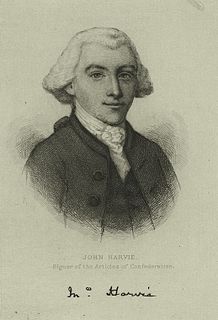
John Harvie was an American Founding Father, lawyer and builder from Virginia. He was a delegate to the Second Continental Congress, where he signed the Articles of Confederation, in 1777 and 1778. He was a successful lawyer and landowner, as well as the fourth mayor of Richmond, Virginia. Thomas Jefferson was a friend since his childhood; his father was Jefferson's guardian. He negotiated a peace treaty in 1774 after the Battle of Point Pleasant. During the American Revolutionary War, he was on the Board of War and operated a prison of war camp on his property, The Barracks.
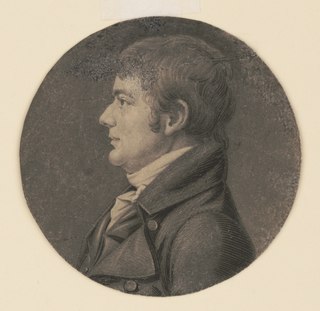
John Wayles Eppes was an American lawyer and politician. He represented Virginia in the U.S. House of Representatives from 1803 to 1811 and again from 1813 to 1815. He also served in the U.S. Senate (1817–1819). His positions in Congress occurred after he served in the Virginia House of Delegates representing Chesterfield County (1801–1803).
Eston Hemings Jefferson was born into slavery at Monticello, the youngest son of Sally Hemings, a mixed-race enslaved woman. Most historians who have considered the question believe that his father was Thomas Jefferson, the third President of the United States. Evidence from a 1998 DNA test showed that a descendant of Eston matched the Jefferson male line, and historical evidence also supports the conclusion that Thomas Jefferson was probably Eston's father. Many historians believe that Jefferson and Sally Hemings had six children together, four of whom survived to adulthood. Other historians disagree.
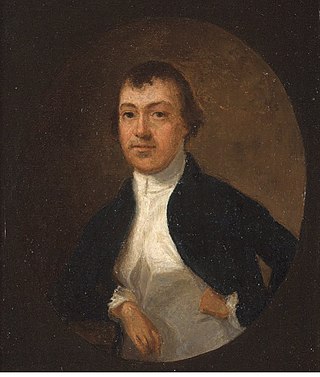
Thomas Mann Randolph Jr. was an American planter, soldier, and politician from Virginia. He served as a member of both houses of the Virginia General Assembly, a representative in the United States Congress, and as the 21st governor of Virginia, from 1819 to 1822. He married Martha Jefferson, the oldest daughter of Thomas Jefferson, third President of the United States. They had eleven children who survived childhood. As an adult, Randolph developed alcoholism, and he and his wife separated for some time before his death.
John Hemmings was an American woodworker. Born into slavery at Thomas Jefferson's Monticello as a member of the large mixed-race Hemings family, he trained in the Monticello Joinery and became a highly skilled carpenter and woodworker, making furniture and crafting the fine woodwork of the interiors at Monticello and Poplar Forest.

James Madison Hemings was the son of the mixed-race enslaved woman Sally Hemings and her enslaver, President Thomas Jefferson. He was the third of her four children to survive to adulthood. Born into slavery, according to partus sequitur ventrem, Hemings grew up on Jefferson's Monticello plantation, where his mother was enslaved. After some light duties as a young boy, Hemings became a carpenter and fine woodwork apprentice at around age 14 and worked in the Joiner's Shop until he was about 21. He learned to play the violin and was able to earn money by growing cabbages. Jefferson died in 1826, after which Sally Hemings was "given her time" by Jefferson's surviving daughter Martha Jefferson Randolph.
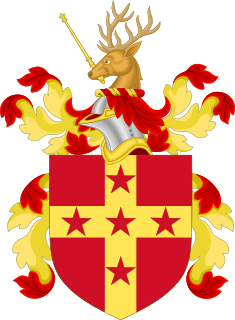
The Randolph family of Virginia is a prominent political family, whose members contributed to the politics of Colonial Virginia and Virginia after statehood. They are descended from the Randolphs of Morton Morrell, Warwickshire, England. The first Randolph in America was Henry Randolph in 1643. His nephew, William Randolph, later came to Virginia as an orphan in 1669. He made his home at Turkey Island along the James River. Because of their numerous progeny, William Randolph and his wife, Mary Isham Randolph, have been referred to as "the Adam and Eve of Virginia". The Randolph family was the wealthiest and most powerful family in 18th-century Virginia.

Thomas Jefferson Randolph of Albemarle County was a Virginia planter, soldier and politician who served multiple terms in the Virginia House of Delegates, as rector of the University of Virginia, and as a colonel in the Confederate army during the American Civil War. The favorite grandson of President Thomas Jefferson, he helped manage Monticello near the end of his grandfather's life and was executor of his estate, and later also served in the Virginia Constitutional Convention of 1850 and at the Virginia Secession Convention of 1861.
Mary Jefferson Eppes, known as Polly in childhood and Maria as an adult, was the younger of Thomas Jefferson's two daughters with his wife who survived beyond the age of 3. She married a first cousin, John Wayles Eppes, and had three children with him. Only their son Francis W. Eppes survived childhood. Maria died months after childbirth.
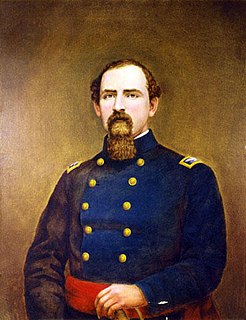
John Wayles Jefferson, was an American businessman and Union Army officer in the American Civil War. He is believed to be a grandson of Thomas Jefferson; his paternal grandmother is Sarah (Sally) Hemings, Jefferson's mixed-race slave and half-sister to his late wife.
Elizabeth Hemings was an enslaved mixed-race woman in colonial Virginia. With her master, planter John Wayles, she had six children, including Sally Hemings. These children were three-quarters white, and, following the condition of their mother, they were enslaved from birth; they were half-siblings to Wayles's daughter, Martha Jefferson. After Wayles died, the Hemings family and some 120 other enslaved people were inherited, along with 11,000 acres and £4,000 debt, as part of his estate by his daughter Martha and her husband Thomas Jefferson.
John Wayles was a colonial American planter, slave trader and lawyer in colonial Virginia. He is historically best known as the father-in-law of Thomas Jefferson, the third President of the United States. Wayles married three times, with these marriages producing eleven children; only five of them lived to adulthood. Wayles' continual rapes of slave Betty Hemings resulted in six additional children, including Sally Hemings, who was the mother of six children by Thomas Jefferson and half-sister of Martha Jefferson.
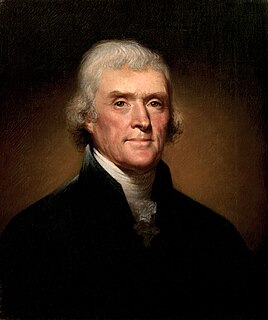
Thomas Jefferson, the third president of the United States, was involved in politics from his early adult years. This article covers his early life and career, through his writing the Declaration of Independence, participation in the American Revolutionary War, serving as governor of Virginia, and election and service as Vice-President to President John Adams.
Edmund Harrison (1764–1826) was a Virginia planter, politician, military officer and member of the Harrison family of Virginia. He represented the counties of Prince George and Amelia in the Virginia House of Delegates, and served as that body's Speaker from 1802 until 1803.
Valentine Wood Southall was a Virginia lawyer and politician. He represented Albemarle County in the Virginia House of Delegates, and served as that body's Speaker 1840–1842 and 1844–1845. Albemarle County voters also elected him to serve in the Virginia Secession Convention of 1861, where he voted with the majority, initially against secession but changing his vote to secede.
References
- ↑ "Henry Skipwith". A History of the Virginia House of Delegates.
- ↑ "Henry Skipwith to Thomas Jefferson, 10 July 1809". Founders Online (National Archives).
- ↑ "Henry Skipwith to Thomas Jefferson, 10 July 1809". Founders Online (National Archives).
- ↑ "Documents filtered by: Correspondent="Jefferson, Thomas" AND Correspondent="Skipwith, Henry"". Founders Online (National Archives).
- ↑ "Henry Skipwith to Thomas Jefferson, 10 July 1809". Founders Online (National Archives).